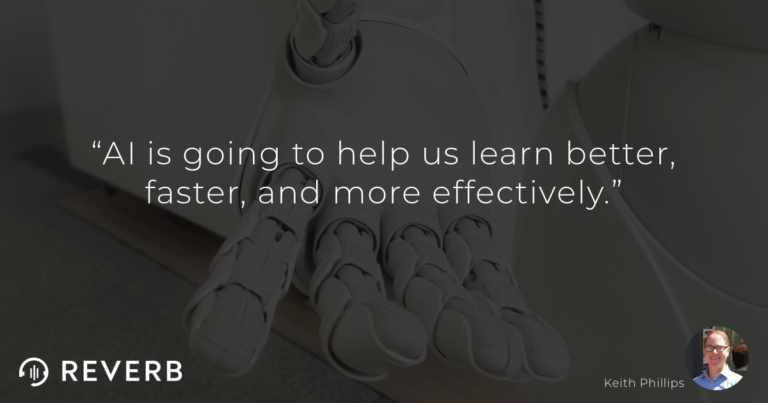The author’s views are entirely his or her own and may not always reflect the views of Reverb.
One of the significant, relatively underexplored ways distance learning will transform over the coming years is with artificial intelligence.
The pandemic did not usher in the digital learning era but has solidified it in many ways.
COVID-19 has revealed the gaps and opportunities that previously existed, and consolidated them, mostly by causing everyone (vendors/providers, learners, etc.) to level-up in this time of extreme need and response.
Distance learning is undoubtedly here to stay, especially due to the increasing use of AI.
One of the significant, relatively underexplored ways distance learning will transform over the coming years is with artificial intelligence.
This is primarily due to AI becoming more and more commonplace (as Gartner predicts). Much of what we already think of when we think about AI is related to “cognitive offloading-” AI helping us to do heavy-lifting in the thinking, data gathering, and analysis departments.
AI is going to help us learn better, faster, and more effectively. In many ways, artificial intelligence will help us do more heavy-lifting type thinking while also further expanding our empathetic capabilities as humans.
These two improvements – increased intellectual ability and expanded empathetic capability – are two raisons d’ être of any educational system. They are and will continue to be a focus of any AI application explicitly designed for education.
Based on my work in both academia and artificial intelligence, I believe we’re going to see massive positive gains as education completely changes due to AI in distance learning.
There are many, many possibilities for educational applications to bring conversational pedagogy, adaptive learning, and intelligent tutoring systems together to create AI with the true ability to help teach.
My example
Here’s an example from my company, as we’re developing a conversational AI explicitly for language-learning.
Our AI uses actual learning ability and gentle corrections to help the learner practice their listening and speaking skills. It does this based on an algorithmic cognitive processor rooted in empathetic benevolence.
This more human touch, coupled with true learning ability, is where conversational AI, and educational AI in general, is headed.
Conversational AI has the potential to reform language learning and even education on a broader scale, while possibly making history through true benevolent super-intelligence- ‘smart with a soul.’
The lesson for Edtech designers and teachers is that artificial intelligence cannot be ignored, and that distance learning, because of conversational AI, is going to further increase in prevalence.






